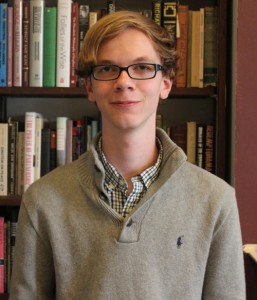Meet the Intern: Arthur Wesley

Get to know one of our Summer 2016 interns, Arthur Wesley! He will be interning in the communications department at the American Humanist Association.
TheHumanist.com: What is your educational and work background?
Wesley: I’m a senior at George Mason University, where I study English and web design. When I’m not in class, I work as a team leader at the information desks on campus. It’s an enjoyable job because I have the opportunity to read or do homework when the traffic is low.
TheHumanist.com: How did you first learn about humanism?
Wesley: I first learned about humanism through my older sister, who came out as secular when I was twelve. She encouraged me to begin thinking critically about the religion in which I had been raised and began to talk about agnosticism and humanism to me. Being the curious person that I am, I secretly visited websites like the “Skeptic’s Annotated Bible” and “Capella’s Guide to Atheism” (sadly no longer running), which led to me secretly identifying as an atheist at the age of fourteen. It wasn’t until a few years later that I began to search for a moral code to fill the void left by religion, and I rediscovered humanism through a book my sister recommended to me: Vonnegut’s Slaughterhouse-Five.
TheHumanist.com: Did you grow up in a traditional religious faith? How did it impact you?
Wesley: I grew up in an evangelical Christian household that taught me to live by a literal translation of the Bible. Growing up, my parents forbade me from playing Pokémon, which they referred to as “pocket devils,” and from reading or watching Harry Potter, which they warned me was full of real spells that would cause permanent damage to me. Being an impressionable young child, I bought into this worldview for a while, and I would become terrified when friends would start playing Pokémon or talking about Harry Potter. This alienated me from truly connecting with a lot of my peers. To this day, I sometimes struggle to connect with friends and peers when the discussion switches to Pokémon, Harry Potter, or something similar.
TheHumanist.com: What interested you most about working for the AHA?
Wesley: I’ve always felt indebted to the web writers, who unlocked my mind from fear and dogma. I once tried to write a thank-you email to one of the writers, who was particularly influential in my path toward secularism, but I don’t think it ever reached him. Realizing that there are so many others still out there living in similar situations to my own has inspired me to follow in their example and reach out to other questioning minds in whatever ways I can.
TheHumanist.com: What book has influenced you the most?
Wesley: I wouldn’t point to a specific book. My biggest influence came when I was in fourth grade and received my first copy of The World Almanac for Kids as a gift. After discovering the science and technology sections, I was hooked. I began collecting every almanac I could get my hands on. Eventually this evolved into subscriptions to Popular Science and Scientific American, which then prompted me to work towards becoming a science writer.
TheHumanist.com: If you could have dinner with any three people in the world (living or dead), who would they be and why?
Wesley: I’d like to have dinner with Carl Sagan to discuss where our technology-driven society is headed. Reading Sagan and watching Cosmos: A Personal Voyage helped me move beyond nihilistic thoughts about my existence and potential and toward viewing the world in a more positive light, one brimming with opportunity.
I’d also like to have Jacque Fresco present for the dinner. Listening to some of his lectures brought me towards a more rational, mechanistic interpretation of my surroundings and daily occurrences. His activism towards creating a sustainable future society through his brainchild “The Venus Project” has inspired me to think about humanity’s collective impact on the planet and how we can create and design sustainable technologies to keep our impacts minimal.
To jazz up the conversation a bit, I’d like Frank Zappa to be there as well. Zappa’s experimentation with expressing political thoughts through music fascinates me. I really like the idea of using music as a way to communicate political thoughts and inspire positive social activism.
